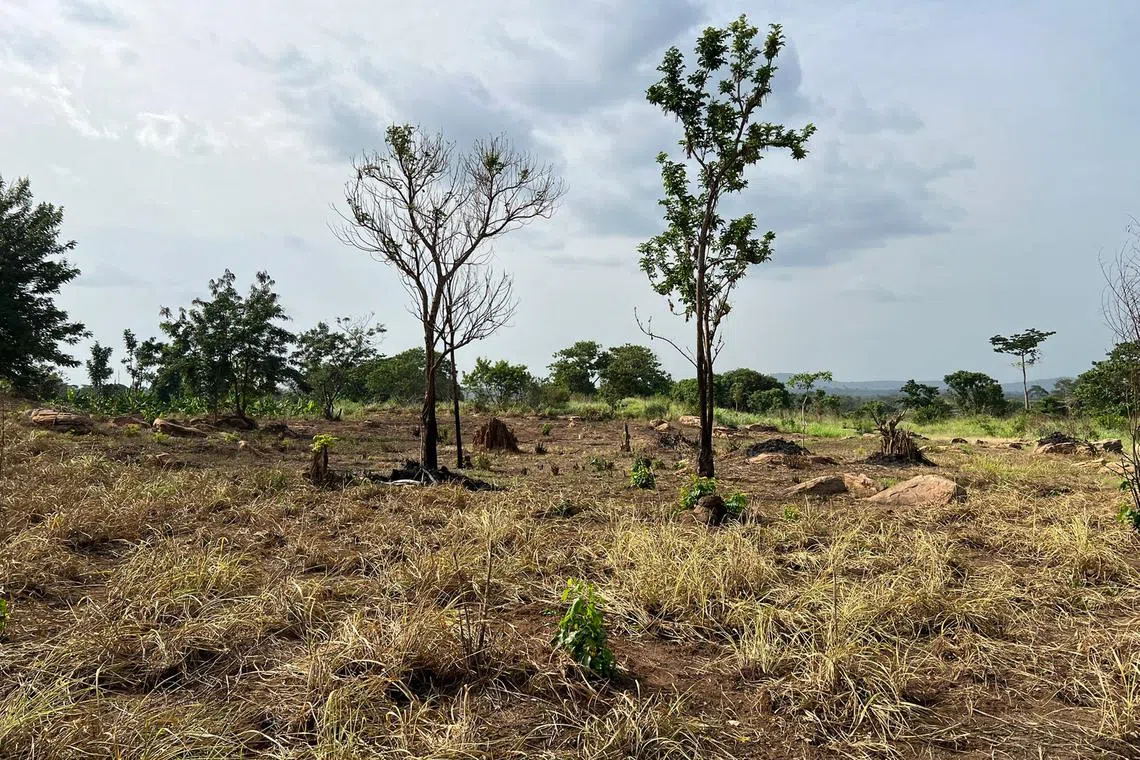Temasek-owned firm to invest in forest restoration project in Ghana
Sign up now: Get ST's newsletters delivered to your inbox

GenZero will be investing “north of US$20 to US$30 million” to restore about 100,000 ha of degraded land in the Kwahu region of Ghana.
PHOTO: GENZERO
SINGAPORE - In a first, Temasek-owned investment platform GenZero will be investing in a forest restoration project in African nation Ghana that can generate carbon credits, which businesses in Singapore can potentially use to offset part of their carbon tax.
In collaboration with Singapore-based AJA Climate Solutions, GenZero will be investing “north of US$20 to US$30 million” (S$26 million to S$40 million) to restore about 100,000ha of degraded land in the Kwahu region of Ghana, said GenZero chief executive Frederick Teo on Thursday on the sidelines of the Ecosperity Week conference.
The funds will be deployed progressively across the project’s two stages – with the first phase set to start in the last quarter of 2023 and the second phase in 2027.
Singapore’s carbon tax, which is applicable to facilities producing more than 25,000 tonnes of greenhouse gas emissions a year, is set to increase fivefold to $25 per tonne in 2024
Singapore-based companies can offset 5 per cent of their taxable emissions using high-quality carbon credits.
In addition, carbon credits that are traded under the Implementation Agreement between countries – Singapore and Ghana substantively concluded negotiations on the agreement at the United Nations COP27 climate conference in Egypt in 2022 – are eligible for such use.
Under these agreements, corresponding adjustments have to take place so that the avoided or abated carbon dioxide (CO2) emissions cannot be counted twice towards both Singapore’s and Ghana’s climate mitigation targets.
GenZero said in a statement on Thursday that Ghana has a rich, diverse forest ecosystem and productive agricultural land, but has been threatened by deforestation arising from agricultural expansion and logging.
Therefore, embarking on nature-based solutions could help the country with reforestation and remove the planet-warming gas from the atmosphere, thus mitigating the effects of climate change.
The first phase of the project will focus on regenerating deforested cocoa lands and rewilding forests across Kwahu East, Kwahu South and Asante Akim North.
Asked about the carbon-reducing potential of the project, AJA Climate Solutions chief executive and co-founder John Mason said that under a high-performance scenario, “just under” 25 million tonnes of CO2 could be reduced over 30 years for the first phase of the project.
The project area was a lush forest about 40 to 50 years ago, but had been heavily exploited for timber over the past few decades, he said. The creation of a new lake in the 1960s led to further deforestation.
The deforestation has led to Ghana losing more cocoa hectares year on year, which is damaging for the country economically as it is among the world’s largest cocoa producers.
The project will involve replanting degraded forest reserves, including growing cocoa trees sustainably in shaded farms to shield these plantations from potentially damaging climate impacts such as floods, heat stress and pests.
In the second phase, the focus will be on regenerating native tree species across degraded forests at the Kwahu Afram Plains, said GenZero.
More than 20 million native species seedlings will be planted over seven years.
Jobs in farming and agroforestry training will be created, and new income opportunities will emerge for the local indigenous communities, empowering some 22,000 families, said Mr Mason.
At the same time, conducive habitats will be created for biodiversity to thrive.
The verification of carbon credits from the Ghana project will then begin in 2028.
Asked about GenZero’s considerations when embarking on the project, Mr Teo said the company evaluates several factors, such as its quality and commercial viability, and the timeframe needed for the project to achieve positive climate impact.
Additionality – which essentially means the project will exist only as a result of the sale of carbon credits – is another important consideration, he said.
From a governance and policy standpoint, Ghana has a clear climate change policy, committed climate mitigation targets, and a comprehensive carbon credit framework at play, said GenZero.



